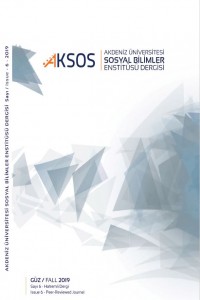Öz
In all schools in
Turkey, English is a compulsory subject. Therefore, English is taught for two
hours a week depending on the school type or grade. Since vocabulary is regarded
as a crucial aspect in language learning, the purpose of the study is to
investigate the vocabulary learning strategies adopted by 9th grade
students, to find out which vocabulary learning strategies used most and the
least. Another purpose of this study is to find whether there were any
differences between male and female learners regarding strategy use.
172 9th
grade students took part in this study and they were asked to fill in a
questionnaire of 25 vocabulary learning strategy items. Also, a semi-structured
interview with ten students was held. The data was analyzed by using frequency,
percentages, and means.
The mostly used
strategies were Social (Discovery) and Determination Strategies and the least ones
are Social (Consolidation) and Metacognitive Strategies. No significant
difference of strategy use between female and male students was observed.
However, when the strategy items were examined individually, slight differences were observed. The findings
contributed the teachers in terms of improving themselves and their students
about the instruction of VLSs and it also helped the teachers to select
appropriate course books and materials related with the strategy use of their
students.
Anahtar Kelimeler
Kaynakça
- Asgari, A., & Mustapha, G. B. (2011). The type of vocabulary learning strategies used by ESL students in University Putra Malaysia. English language teaching, 4(2), 84.
- Cameron, L. (2001). Teaching languages to young learners. Cambridge: Cambridge University Press.
- Ellis, N. C. (1996). Working memory in the acquisition of vocabulary and syntax: Putting language in good order. The Quarterly Journal of Experimental Psychology Section A, 49(1), 234-250.
- Folse, K. S., & Briggs, S. J. (2004). Vocabulary myths: Applying second language research to classroom teaching (No. Sirsi) i9780472030293). Ann Arbor: University of Michigan Press.
- Gu, Y., & Johnson, R. K. (1996). Vocabulary learning strategies and language learning outcomes. Language learning, 46(4), 643-679.
- Levenston, E. A. (1979). Second language acquisition: Issues and problems. Interlanguage studies bulletin, 147-160.
- McCarthy, M. J. (1984). A new look at vocabulary in EFL. Applied linguistics, 5(1), 12-22.
- Neuman, S. B., & Dwyer, J. (2009). Missing in action: Vocabulary instruction in pre‐K. The reading teacher, 62(5), 384-392.
- Nunan, D. (1999). Second Language Teaching & Learning. Heinle & Heinle Publishers, 7625 Empire Dr., Florence, KY 41042-2978.
- O'Malley, J. M., O'Malley, M. J., Chamot, A. U., & O'Malley, J. M. (1990). Learning strategies in second language acquisition. Cambridge University Press.
- Oxford, R. (1990). Language learning strategies. New York, 3.
- Riankamol, N. (2008). A survey study of vocabulary learning strategies of gifted English students at Triam Udomsuksa School in the first semester of academic year 2008. Language Institute, Thammasat University.
- Schmitt, N. (2008). Instructed second language vocabulary learning. Language teaching research, 12(3), 329-363.
- Vann, R. J., & Abraham, R. G. (1990). Strategies of unsuccessful language learners. TESOL quarterly, 24(2), 177-198.
Ayrıntılar
| Birincil Dil | İngilizce |
|---|---|
| Bölüm | Araştırma Makalesi |
| Yazarlar | |
| Yayımlanma Tarihi | 12 Aralık 2019 |
| Gönderilme Tarihi | 13 Eylül 2019 |
| Yayımlandığı Sayı | Yıl 2019 Sayı: 6 |
Akdeniz Üniversitesi Sosyal Bilimler Enstitüsü Dergisi (AKSOS)

